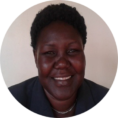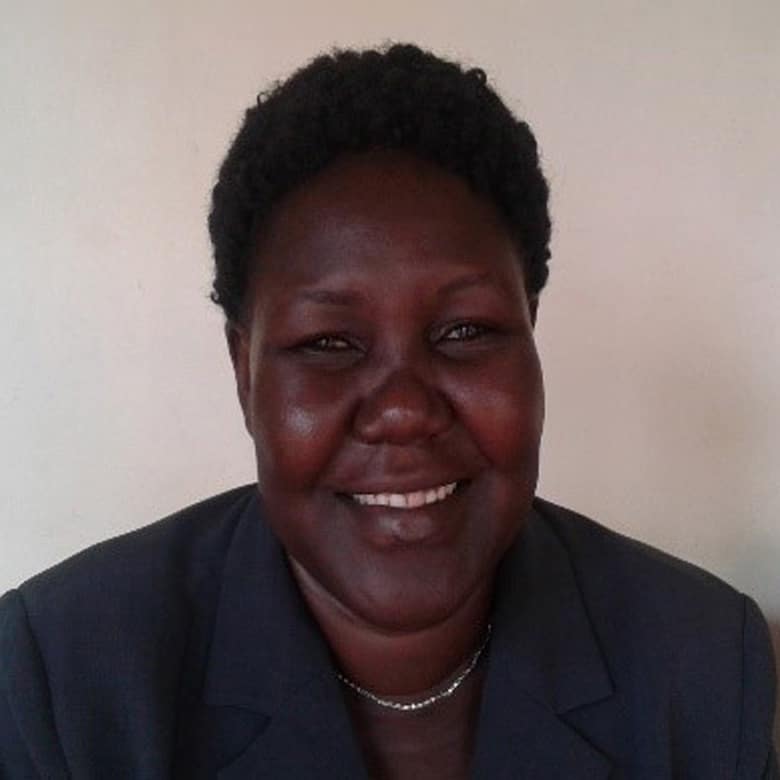How did your career journey lead you to Geneva Global?
My career began nearly twenty years ago as a primary school teacher in a rural school in Eastern Uganda not unlike the schools where we run Speed School. I spent five years as a teacher before returning to school myself, seeking a degree in teacher education. This led me to later join a Primary Teachers College and take a job as a Teacher Training Officer. In that role I spent time working to build capacity among teachers on a project in South Sudan alongside other civil servants. After three years, I returned to academia and enrolled in a master’s degree in Education. After completing the program as one of the top students, I was offered a brief contract with the University as a Professional Development Tutor. I ran a certificate course in literacy and numeracy in the West Nile region of Uganda that trained preschool and primary school teachers. This led me to an opportunity with PEAS (Promoting Equity in African Schools) where I worked as an education specialist in charge of continuous professional development. I led trainings, designed training materials, and provided support supervision for teachers.
When I saw the Geneva Global listing for Education Program Manager in 2018, I was in disbelief. The role seemed as if it were designed with me in mind. It perfectly combined all the experience I had gained throughout my career and education and would allow me to work toward my passion of ensuring education for all. I have not looked back since joining the team and feel extremely proud of all we have accomplished.
How has your role at Geneva Global evolved?
When I first joined Geneva Global’s Uganda team, my title was Education Manager. I immediately felt very comfortable with the organization and passionate about our mission. I was thrilled to have the opportunity to work closely with former colleagues and mentors at the local Primary Teachers Colleges. Together, we established a network of education professionals from the government and civil society organizations to support Speed School. About a year into my time at Geneva Global Uganda, the senior member of our team stepped down and, in their absence, I was tapped to step into the position of Program Director. Since then, our team has grown significantly, both in number and in capacity. I proudly lead a team of seven extremely qualified, passionate individuals. Our network of education professionals continues to grow each year, as does the number of beneficiaries we reach. I am looking forward to the many ways our team and the Speed School program will continue to grow in the coming years.
What fulfills you most about your role?
I love my job for so many reasons. First, I am very passionate about the mission of Speed School. I have the opportunity to visit Speed Schools throughout the year and the difference I see in the students from the beginning to the end of the year is incredible. Even beyond their improvement in the classroom, they grow and change in amazing ways; you can see they are much more confident and willing to step out of their comfort zone. This reminds me that we are not just equipping them with literacy and numeracy skills, but also with real life skills that will make them better, stronger people even after their time in Speed School.
Another fulfilling element of my job is watching those who look up to me succeed. I enjoy working with my team to confront challenges, supporting them in finding solutions and seeing them become stronger for it. I am fortunate to play this role for our office members at GGU, but also with members of our collaborating partner organizations and even the Speed School facilitators. When I visit the schools, facilitators run to me and call me “Mama Speed School.” They look to me as if I have every answer, but my role is not to tell them how to solve their problems, it is to help them find their own solutions. It brings me so much joy to return to a Speed School and see the improvement in the facilitators and how hard they work to help their students improve as well. It reminds me even on the days that I am most exhausted that all our hard work is not in vain.
How has the Education landscape in Uganda changed over the last few years?
In my time in the sector, I have witnessed a complete overhaul of the Ugandan curriculum, both in primary schools and primary teachers’ colleges. When I began my career as a teacher in 2001, the material covered in schools did not align with the realities that existed within the Ugandan context. This made it extremely difficult for students to relate to the lessons. For example, back when I was a student in school, use of the local language in instruction was forbidden – a relic of Uganda’s colonial past. In 2007, increased attention was given to making the curriculum more relevant, drawing connections to local contexts. Now, instruction in the local language is encouraged as more children are able understand the lessons and fewer students are being left behind.
Another exciting evolution in recent years is the increased use of continuous assessment of students, a strategy the Speed School program employs well. Traditionally in Ugandan schools, promotion from one grade to the next was based on one single exam at the end of the year. This meant that if a student had one bad day or missed the exam, they would not pass on to the next grade which led many students to drop out. Today, with more emphasis placed on continuous assessment, we can look at the child in a more holistic way when determining whether they are ready to be promoted. This allows us to take into consideration other elements beyond grades such as their interpersonal relationships and emotional maturity.
What are you most excited about for the future of education in Uganda?
Just as there has been a shift toward increasing local relevance in the curriculum, we are seeing gradual change in the way that the curriculum is being delivered by teachers. Recently, there has been increased discussion about moving away from traditional teacher-centered instruction and rote learning, toward learner-centered instruction and activity-based learning. This is at the core of the Speed School pedagogy and our success in covering three years of curriculum with formerly out of school children in just a 10 month period is emblematic of the real change this shift could bring to the traditional school system. Although this is not yet being used effectively in most schools and the change is certain to be gradual, I want to believe that our constant advocacy and showcasing of activity-based learning in our classrooms will play a significant role in the scaled adoption of these methods over time. I am confident we are moving in that direction. As one ministry official recently said in a speech, “If the children cannot learn the way that we teach, we need to teach in a way that the children can learn.”
What advice would you give to someone who wants to work in development sector?
The very first thing you need is passion. You must believe in the value and mission of whatever it is you are working on. Working in the development sector is challenging and requires you to give more of yourself and your heart than most other jobs. If you do not have passion, you will eventually burn out. Passion breeds resilience because even in the most difficult times it will keep you from giving up.
Beyond the passion, you must develop the knowledge, skills, and attitude for success. You must commit yourself to your own education and seek out opportunities to gain experience, both academically and personally. This goes beyond just understanding the sector or getting a degree. You cannot do this work if you are not willing to commit yourself to understanding the history, culture, and politics within the local contexts and understanding these things takes time and patience.
What are you reading right now?
I don’t often have time to read for pleasure these days. I spend most of my time reading about teacher and school improvement strategies. Ever since the pandemic began, I have been very concerned about the quality of education children are receiving in Uganda, my children included. I began working closely with their school and the schools in my home area, to help them strategize so they can support their students just as we support our learners, so most of my reading is focused on these subjects.
Where do you get your news?
For my news, I usually turn to local and international television, local newspapers, and radio stations and from the many education newsletters I subscribe to. I try to make sure I get my news from diverse sources to avoid falling into the trap of biases which can sometimes be difficult but is always rewarding to understand the news from multiple perspectives.
How has your work-from-home journey been? Any tips or tricks?
When I first began working from home it was very difficult. It took some time to get used to but eventually I found my rhythm. My children were home from school and did not know what to do with themselves. As a mother, it is difficult to make them understand that there are times when I cannot give them my full attention. I had to be mother, teacher, and Program Director all from my home. Eventually we all settled into the new normal.
Another complication of work from home for all of us in Uganda was access to stable internet. We lose internet connection so often; it happens when there is a storm, if the skies are too cloudy, when there is political activity, or sometimes for seemingly no reason. When we are in the office all together, we can continue to be productive by working together, but when we are all working from our homes and spread out across the country, it can be challenging. Despite this, we all found our way and managed to achieve great things throughout the work from home period.
To meet the rest of our team, please click here.

Rebecca Ecwou is an Education Program Director in Geneva Global’s Uganda office. She is an education specialist and manager with two decades of experience who is goal oriented and has a track record for outstanding performance. She advocates and specializes in managing the education of children from low resource communities; thus, she takes great pride in being part of a team that aims at improving literacy and numeracy in formerly out of school children in Uganda.
You can reach her at [email protected] and read her full bio here.

